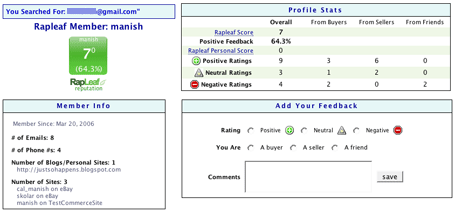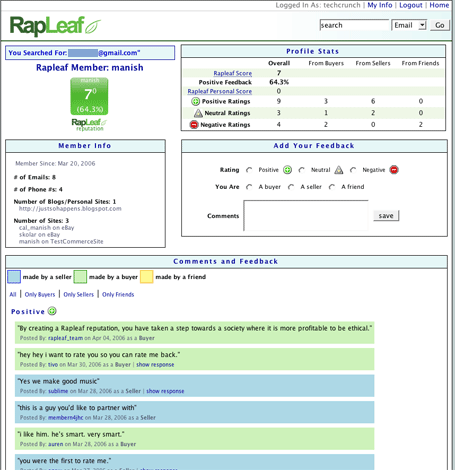eBay’s feedback system is, arguably, their most valuable asset. It provides the grease necessary to make complete strangers comfortable enough to buy and sell from each other. But it’s a closed system – only eBay transactions can affect a user’s feedback score. And as much as eBay doesn’t like it, these users (and more) buy and sell stuff through services other than eBay all the time, online and offline. There is tremendous demand for third party services to incorporate eBay’s feedback system into their applications to make them more usable. But don’t expect to see eBay embrace mashups any time soon, or ever.
Last year I asked for an open version of eBay’s feedback system to be created (see no. 3 here). I also suggested that iKarma, who’s in this space, make changes to their product to address this larger market. But until now, no one came at this problem head-on.
Enter Rapleaf, a new San Francisco-based service created by Auren Hoffman and Manish Shah that is a fully open version of eBay’s feedback system. It’s in private beta, but will be launching to the public on May 7, 2006.
Rapleaf will allow anyone to leave feedback for anyone they’ve transacted with. Others can use this feedback to help them determine if they are doing business with someone who’d likely to engage in fraud. Rapleaf is eBay feedback for the rest of the web, and the offline world.
There are three important things to understand about Rapleaf – the interface and basic feature set, fraud prevention and detection, and their API set and related policies.
Interface and Features

Rapleaf allows any user to leave feedback for anyone (whether they are a user or not), based on a unique email address or phone number. Type that identifier into the search bar. If no results occur, you can be the first to leave feedback for that person. This can be someone you’ve bought or sold with, or just a friend that you want to endorse. Like eBay, a free-text area is included for comments in addition to a positive/neutral/negative rating.
A person’s feedback rating is a raw score, with a point added for a positive review and a point subtracted for a negative review (just like eBay). Non-transaction endorsements are calculated and shown separately. Various stats are calculated and displayed based on feedback ratings by others (see screen shot below).
Fraud Prevention and Detection
eBay knows when two people have transacted. That removes a lot of fraud issues (although a big issues on eBay has been users selling thousands of low priced items to jack up their feedback and then engaging in fraud with high ticket items). Rapleaf won’t have this luxury, and so they are focused on preventing and detecting fraud in their system.
First, any feedback left of a user can be challenged. At first this will be handled by Rapleaf employees. Later, they will probably use a third party to handle disputes.
Rapleaf will also employ human and machine based analysis of all feedback to look for patterns that suggest fraud, particularly in boosting a feedback rating. A user can probably get a an extra point or two every few months without being detected. But co-founder Auren Hoffman tells me he’s confident that they will be able to detect any large scale fraud attempts and shut the offending account(s) down.
He won’t disclose his trade secrets, of course, and so I have no way of telling if he’s right. But if they’ve nailed this issue, the biggest one facing them, then they’ll have gone a long way to achieving success.
Open, Open, Open APIs
Rapleaf will (on launch) deploy an API to allow third parties to access the key parts of the service. Account creation, review creation and feedback scores will all be accessible, and free, to third parties who choose to integrate. For non-eBay shopping sites, Rapleaf will be a competitive leveler. And if enough sites start to integrate with Rapleaf over time, the data will become even more relevant than eBay’s.
Final Thoughts
If Rapleaf succeeds in their plans, it will make the Internet a better place to do business. And Rapleaf won’t be limited to online transactions – there is no reason that transactions occuring offline can’t be measured by Rapleaf as well. The fact that an identifier can also be a phone number tells me that Rapleaf is already thinking this way.
Business development will be an important area for Rapleaf to nail. Their APIs will spur countless mashups without a direct business deal. But I also expect to see some big retailers, classified sites and shopping engines integrate with Rapleaf over time. That will require a good business development team to search out and close those deals.
Additional Screen Shots:

